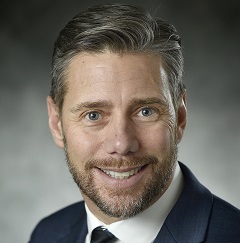An Interview with Greg Bishop
An Interview with Greg Bishop
By Rob Kirsic
January 2023
Greg Bishop has been the General Manager, Social and Community Services Division at the County of Simcoe since 2015. This role includes leadership and oversight to the Social Housing, Community Services, Ontario Works and Children Services Departments.
Since joining the County in 1991, Greg has held a number of positions within the Social and Community Services Division, including Director of Children and Community Services. Greg has played an integral role in the development of many County initiatives and programs, including Our Community 10-Year Affordable Housing and Homelessness Prevention Strategy, Local Immigration Partnership, and Simcoe County Positive Aging Strategy.
Greg is dedicated to providing the very best services to the residents of Simcoe County and shares his strengths in community development, capacity building, and policy analysis. Greg has served on several boards and committees, including the Ontario Municipal Social Services Association Board of Directors and several Provincial-Municipal Policy Advisory and Reference Groups.
Greg is also one of the recipients of the 2022 OMSSA Lifetime Achievement Award. OMSSA sat down with Greg to discuss human services, his career, and involvement with OMSSA.
This interview has been edited and condensed.
OMSSA: Human services delivery between more than one level of government brings challenges and opportunities, especially as governments and priorities change over time. In your experience, what should human services staff know and think about when it comes to the relationship between the province and municipalities as it relates to the delivery of human services?
 Greg Bishop (GB): The relationships that OMSSA and individual Municipal Service Managers have with different levels of government – particularly with the Province is key. OMSSA has a strong reputation and long established relationships with the Province at a staff level. There are times; however, when relationships need to be strengthened or developed from the beginning when new governments are elected and/or with the changing of key staff across ministries, either through retirements or if they move on to other ministries or assume leadership of different portfolios. Also, while some government priorities may not align with the interests of Municipal System Managers and OMSSA, it is key to articulate our concerns and seek out opportunities to work with the government to influence new programs and initiatives, and collaborate on existing programs, so that positive relationships continue. I think this is key so that we continue to be considered for consultation and ideally have some influence to policy and /or its implementation.
Greg Bishop (GB): The relationships that OMSSA and individual Municipal Service Managers have with different levels of government – particularly with the Province is key. OMSSA has a strong reputation and long established relationships with the Province at a staff level. There are times; however, when relationships need to be strengthened or developed from the beginning when new governments are elected and/or with the changing of key staff across ministries, either through retirements or if they move on to other ministries or assume leadership of different portfolios. Also, while some government priorities may not align with the interests of Municipal System Managers and OMSSA, it is key to articulate our concerns and seek out opportunities to work with the government to influence new programs and initiatives, and collaborate on existing programs, so that positive relationships continue. I think this is key so that we continue to be considered for consultation and ideally have some influence to policy and /or its implementation.
There will be times where the relationship will be stronger than others and, while trying to bring our issues to the forefront is important, there is also a recognition that senior staff may have limited control over how a government mandate is rolled out.
OMSSA: Speaking of OMSSA, you served the Association in various capacities to collaborate with other levels of government. In your opinion, and based on your experience with OMSSA, what are some of the priorities the Association should focus on in the next few years?
GB: I think one of OMSSA’s many strengths is being able to pull together the many collective voices of municipal Service Managers regarding government policy and or implementation. We want to be a credible, respected voice at the table. This does not mean we are always going to agree with the direction of the government, but just to have that kind of calm, calculated, informed role, I think has been, and is, respected and valued by the Province.

Working with the Province with respect to social assistance reform is critical to ensure that there continues to be client-centred service delivery focus from the point of intake and throughout the program. I also think the low Ontario Works benefit rates for both basic needs and shelter portions continue to be alarmingly low. And while there was an increase to ODSP recently, increasing the low benefit rates for social assistance would assist in addressing the gap that many individuals and families are experiencing.
 With respect to childcare, like many of my colleagues, I am just thrilled about the opportunity for a national program. While there have been challenges with the first year of implementation – I think it has been because the roll out has been fast paced and initially it may appear that it is not exactly everything that we hoped it would address, but it is a very positive move towards providing greater access to families for quality early learning and child care. While reduced fees for all families is very important for access, growing the licensed system is critical so more spaces are available to families. I think all levels of government and community stakeholders recognize that addressing the labour shortages of Early Childhood Educators (ECEs) is crucial and that recruitment and retention challenges across the sector need to be addressed so that the system can grow and I am hopeful that this will be addressed in future years of the roll out of the Canada-wide Early Learning and Child Care program (CWELCC). The success of the program is not going to be possible if we do not have the ability to have a stable childcare system, let alone expand it.
With respect to childcare, like many of my colleagues, I am just thrilled about the opportunity for a national program. While there have been challenges with the first year of implementation – I think it has been because the roll out has been fast paced and initially it may appear that it is not exactly everything that we hoped it would address, but it is a very positive move towards providing greater access to families for quality early learning and child care. While reduced fees for all families is very important for access, growing the licensed system is critical so more spaces are available to families. I think all levels of government and community stakeholders recognize that addressing the labour shortages of Early Childhood Educators (ECEs) is crucial and that recruitment and retention challenges across the sector need to be addressed so that the system can grow and I am hopeful that this will be addressed in future years of the roll out of the Canada-wide Early Learning and Child Care program (CWELCC). The success of the program is not going to be possible if we do not have the ability to have a stable childcare system, let alone expand it.
OMSSA: Looking back on your career to date, are there one or two achievements that stand out to you? What are they and what makes them stand out to you?
GB: Being part of dynamic teams throughout my career. I have really been blessed to have worked with and been a part of many great teams internally at the County of Simcoe and have also always appreciated opportunities to connect and work with colleagues from other service areas. I’ve been fortunate that the teams that I have worked with as a peer and lead at the County of Simcoe have had great synergy. There is a lot of talent across our sector and growing and developing teams and making space for new leaders is critical. Identifying opportunities to support each other across disciplines is important and there are often areas of common ground to connect the work from one program area to another.
Another achievement I have been proud of is working together to build community hubs in Simcoe County. I am very proud to be part of several new affordable housing and housing with supports developments that our County Council has supported since 2015. Where possible, these developments have included creating commercial and common program space where services such as OW, ODSP, Adult Learning offered by the School Board, Child Care and Early ON and other community partners to come together as a physical and integrated hub location.
OMSSA: Is there anything else you would like to share with our members that I did not ask about?
GB: I am grateful to have worked with so many intelligent, committed and talented people over the years, and that includes Municipal and Provincial colleagues. Learning from each other, working towards common goals - sharing experiences, challenges and opportunities has been an important part of my career and leadership development. Our work can feel lonely and misunderstood at times and leveraging strength from others has been helpful to me. Finding and sharing humour has been a source of relief comfort and strength at times during challenging or stressful periods. Relying on the strength and best intent of teams has always been helpful.
I have had many mentors over the years and have appreciated learning from others where possible. Providing opportunities for open, honest dialogue with new leaders helps to demystify senior leadership roles and provide opportunities to grow and develop is key as we anticipate a large turnover leaders in the municipal social services sector.
I will greatly miss the people I work with and opportunities to connect with colleagues through OMSSA. I will also miss much of the work but after 32 years, I am looking forward to taking a break to enjoy some extended time for travel and contemplate next chapters.
Thanks Rob and thank you to OMSSA for this opportunity. I humbly and sincerely appreciate this recognition.
OMSSA: Thank you, Greg.
About the Author

Rob Kirsic is the Communications and Member Engagement Manager with OMSSA. Rob started with OMSSA in 2021 and has over 14 years of communications and public relations experience in the private, public, and not-for-profit sectors.
